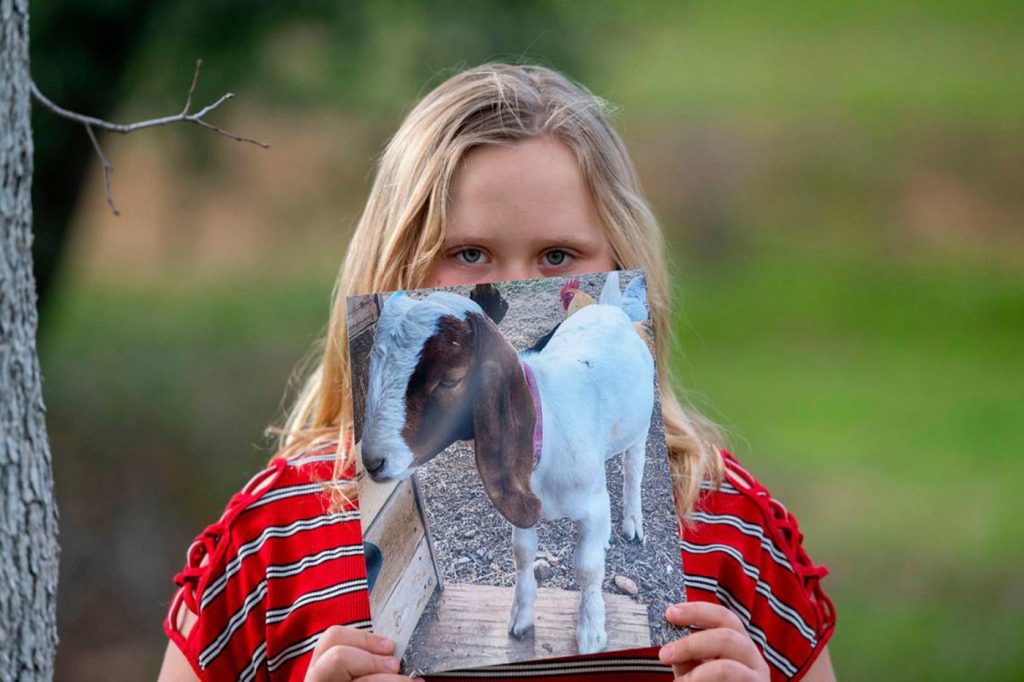Cedar the goat’s death must not be in vain!
Bruce, raised by a Fullerton Union High FFA student, went to the Farm Sanctuary in Acton rather than to slaughter in 2019. (Photo by Hans Gutknecht, Los Angeles Daily News/SCNG)
A new bill in Sacramento, sponsored by an Orange County nonprofit and introduced by a San Jose legislator, would see to that.
Cedar was raised by Jessica Long’s 9-year-old daughter, E.L., and entered in the Shasta District Fair in 2022. At some point in the process E.L. decided she loved the little goat and didn’t want him to end up as barbecue on someone’s plate. At the fair, she wept in his pen. And her family spirited him away.
What happened next has, literally, become a federal case, with the Long family suing in U.S. District Court and California Attorney General Rob Bonta countersuing to hold the Longs liable. Grand theft, officials called it.
Related Articles
Pet Gila monster bites man, who dies in what US experts call a “rare event”
California man who may have been dog breeder mauled to death by pit bulls in backyard
Mountain lion ‘latched onto’ cyclist’s face and neck
70 coins removed from stomach of alligator at Nebraska zoo
Ghost, lost in the desert for 9 months, is finally rescued
Spoiler alert: Cedar is dead. After tremendous outcry, Bonta dropped the counterclaim. And, now, Assembly Bill 3053 would change the rules so kids can enter animals in county fairs without sentencing their beasts to death and their people to drawn-out legal battles.
“A few years ago, we spent $5,000 trying to find a home for pigs after kids had a change of heart,” said Judie Mancuso of Social Compassion in Legislation, an animal rights nonprofit based in Laguna Beach and the bill’s sponsor. “Then came the Cedar debacle…. We said, ‘The timing is right. Let’s do this bill.’ “
On Feb. 16, Assemblymember Ash Kalra, D-San Jose, introduced AB 3053. Attitudes about school farm programs clearly are changing.
$902
You go to the county fair, you see the pigs and cows and goats in their pens, you see the kids caring for them, you uncomfortably acknowledge that there will be an auction at fair’s end and that these living, breathing animals will be dinner. It’s an educational refresher about California’s agricultural roots, and about where food really comes from and what it takes to get it to the table.
Playful piglets at OC Fair and Event Center Centennial Farm in 2022. (Photo by Mindy Schauer, Orange County Register/SCNG)
Long enrolled E.L. in the local 4-H chapter’s youth livestock program in Shasta County in the fall of 2021. She bought E.L. a goat, which they named Cedar, and she filled out the forms to enter Cedar in the 2022 Shasta District Fair. Perhaps Long didn’t fully comprehend the legal minutiae behind the “terminal sale” verbiage — which means the animals would be sold to the highest bidder and slaughtered for meat.
The youth livestock auction was on June 24, 2022. Cedar was sold to Republican gubernatorial candidate Brian Dahle and California Assemblymember Megan Dahle for $902. The fair was to get $63.14 of that, with $838.86 going to the Longs. Cedar’s meat was to be used at the annual Shasta Fair Association and 4-H barbecue on July 9.
But on June 25, shortly after the auction but before the transfer of Cedar for slaughter, E.L. “exercised her statutory rights as a minor under Cal. Fam. Code §6710 to disaffirm any contract that may have existed with respect to Cedar,” court paperwork says. “Mrs. Long and E.L. then removed Cedar from the Shasta District Fair.”
And that’s where things got crazy.
Long worked in good faith to settle the dispute, court documents say. She offered to reimburse the district fair for its troubles, but the fair was having none of it. The 4-H volunteer who organized the annual barbecue insisted that it owned Cedar’s meat. The fair’s livestock manager called Long on June 26 and demanded Cedar be returned for slaughter — or the Longs could face felony charges of grand theft.
“Desperate to avoid the prospect of even frivolous criminal charges,” court documents say, Long contacted the Dahles, who agreed to forego the sale and slaughter of Cedar. Long then sent the fair’s CEO a letter offering to pay damages. But fair officials were getting angry: The battle over Cedar hit social media and thousands upon thousands of calls and emails were flooding in, calling officials nasty names and beseeching them to spare Cedar’s life.
A cow awaits auction at the OC Fair’s annual Junior Livestock event in Costa Mesa in 2023. (Photo by Mindy Schauer, Orange County Register/SCNG)
On June 28, the fair CEO rejected Long’s offer to pay damages, saying “the social media [response to Cedar] has been a negative experience for the fairgrounds as this has been all over Facebook and Instagram, not the best way to teach our youth the value of responsibility.”
‘No one needs to know’
Long submitted a claim stating her intention to sue over all this, which she maintains should have frozen further action on Cedar’s life until the dispute was resolved.
But the fair called the Shasta County Sheriff’s Department to investigate theft. Two deputies drove 500 miles “at taxpayer expense, and crossed approximately six separate county lines, all to confiscate a young girl’s beloved pet goat….”
They went first to Bleating Hearts Sanctuary in Napa. Cedar wasn’t there. They tracked him down to Billy’s Mini Farm in Forestville, where they seized the goat (without a warrant) and turned him over to fair officials who, court documents maintain, held him for weeks before slaughter.
During that period, in July of 2022, court documents show there were flurries of texts between fair and 4-H officials. “Talked to sheriff and he said to wait until he talks to DA before we kill goat,” the fair livestock manager texted to the 4-H Club volunteer. “Bowman is killing goat today finally.” “… no one needs to know about this. U me and Kathy are only ones. It got killed and donated to non profit if anyone asks.”
Baby chickens at the Centennial Farm at the OC Fair and Event Center in Costa Mesa in 2018. (Photo by Mark Rightmire, Orange County Register/SCNG)
The Longs sued in federal court last year. “This case concerns damages… arising out of well-established violations of the Fourth and Fourteenth Amendments to the U.S. Constitution, as well as an egregious waste of police resources,” filings say.
Compounding the state’s unfathomably tone deaf response, Attorney General Rob Bonta — acting as the attorney for the fair, which is part of the California Department of Food and Agriculture — filed a counterclaim against the Longs, demanding the Longs pay the government’s attorneys’ fees and reimburse the Shasta District Fair for damages.
The Longs’ attorney, Vanessa Shakib of Advancing Law for Animals, filed a special motion to strike the AG’s counterclaim as a Strategic Lawsuit Against Public Participation, or SLAPP suit. “We argued the Attorney General’s counterclaim was legally frivolous and intended to chill the First Amendment rights of the Long family,” Shakib said by email.
After that filing, the AG backed off.
“Existing California law already allows families to walk out of terminal auctions. That is the heart of our civil rights litigation on behalf of the Long family,” Shakib said. “In Cedar’s case, a group of government officials transformed a $63 civil dispute into felony theft to create a false pretense for an unlawful search and seizure. These officials drove hundreds of miles at taxpayer expense, and stopped at nothing—including the United States Constitution—to ensure a child’s animal was illegally slaughtered without due process.”
Legislative fix
In this 2015 file photo, Bruno Barba, 16, with Lola, the pig he raised through the Future Farmers of America program at Fullerton Union High. (COURTESY FARM SANCTUARY)
E.L. is certainly not the first kid to recoil at the prospect of sending her farm project to its death.
In 2015, Bruno Barba was in Fullerton Union High School’s Future Farmers of America program. Intellectually, he understood he was raising piglet Lola to be auctioned off for bacon. But pigs are smart, and whenever Lola saw Barba, even from a distance, she’d start squealing with joy. He just couldn’t make her a porkchop. When he began casting about for an alternate ending, teachers and classmates discouraged him, urging him to finish what he started. But Barba found a a home for Lola on a Northern California farm, and there Lola went.
“I think it’s very different to see firsthand,” his mother said back then. “To see the life of the animal, as opposed to seeing it at the market and thinking, ‘Here’s dinner.’ “
In 2019, Bruce, Pam, and Kevin (goats) and Shawn and Phry (sheep) went to Farm Sanctuary in Acton rather than to the fair’s livestock auction. The animals were raised by Fullerton High Future Farmers of America students who shared Barba’s anti-slaughter sentiment.
AB 3053 would make such alternate endings easier. Junior exhibit entries in county fairs could be withdrawn at any time before offsite transport, and winning bidders could choose to pick up live animals rather than slabs of meat.
“We applaud proposed legislation allowing successful bidders to take their animals home alive,” said Shakib, the Longs’ attorney. “The government shouldn’t force people to kill their animals. This commonsense language is an important step in protecting property rights.”


